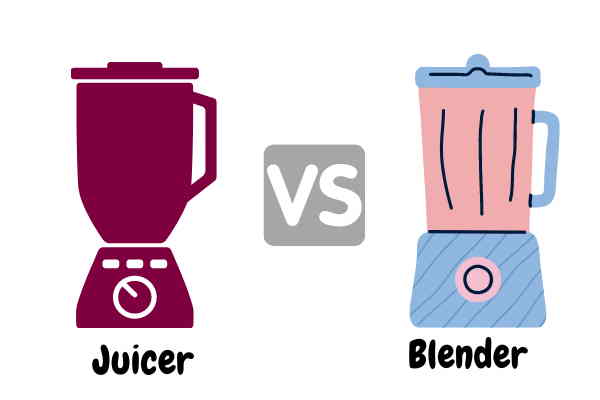Updated on February 28, 2023
It is a common assumption that Can a juicer be used as a blender? This adds to misunderstanding among shoppers. Who mostly want to minimize as quickly as possible the pile of fruits and vegetables in their kitchen into a nutritious glass of liquid? But there are various options to do that, and learning what they are is crucial to make the right one for you.
The two most common fruit and vegetable processors in the industry are blenders and juicers. They will process fruits and vegetables as quickly as possible into a delicious, healthy drink. The way they do this and the end product, though, are completely different.
You’ve come to the right spot if you’re struggling to determine if it’s a blender or juicer you require. To support you make the correct decision and select an appliance that fits your requirements well, we have prepared a comprehensive blender vs. juicer analysis.
Can A Juicer Be Used As A Blender?
Juicing is pointless, many blending fans will tell you. Though keen juicers will say that it is the easiest way to provide all the nutrients you need. The fact is that there is no correct answer; all manufacturing processes have advantages and disadvantages. And both have their place in a safe kitchen. This article is very useful for you to explore some of the advantages of each one.

The Benefits of Blending
No Waste of pulp
A blender processes everything that you bring into it. There is no fibrous pulp to be thrown away at the end. If while using a juicer you are concerned about the ‘waste,’ then a blender can sound more relaxed.
Slow-Release of Energy
The fiber in the drink slows down digestion to steadily and uniformly release steam. This removes the peaks and downs of sugar and ensures that you can remain complete for longer after consuming it.
Helps in Digestion
In the digestive tract, the fiber from fruits and vegetables makes its way, working as a broom that cleans it, eliminating contaminants and facilitating frequent removal.
Best Celery Juicer
The Benefits of Juicing
Fast Absorption
You leave much of the indigestible fibrous pulp behind as you remove the juice from your fruit and vegetables. Your body readily consumes the nutrient and mineral-packed juice. It is fast and easy to absorb all over the body.
Quality Bag
The juicing method extracts a lot of the bulk from your juice. Meaning you can cram into the same sized glass the antioxidants and nutrients from a lot of more fruits and vegetables you have.
Digestion is Simple
Since the fiber has been extracted, the juice’s liquid content is gentle on the digestive tract. This can be a perfect opportunity to give the system a rest without losing out on the vital nutrients if you have digestion issues.
To Juice or Blend? Which one is best?
A point of debate among healthier eaters tends to be the juicer vs. blender controversy. No one right response would satisfy everyone, like so many other great debates. Based on particular considerations regarding diet or digestion, a small budget, or a clear preference for one form of drink, you may select one over the other. But a well-equipped kitchen might comfortably hold both a juicer and a blender and reap all the advantages of both.
Advantages of using a blender
- Because all materials are washed, no fibrous pulp is thrown away.
- The presence of fiber from fruits and vegetables aids digestion and helps eliminate and facilitate toxin removal daily.
- The fiber often slows down absorption to increase gradual and even energy release, avoiding peaks and lows in sugar.
- Suitable for most fruits and vegetables, particularly softer ones.
Advantages of using a juicer
- The juice contains no indigestible fibrous pulp to enable easy digestion and good absorption of vitamins and nutrients.
- Zero fibrous pulp ensures that you can pack nutrients from a variety of vegetables and fruits in one sized glass.
- Suitable for fruits and vegetables that are heavy. Most masticators may also treat some styles of smooth, juicy fruits and greens.
Key Points
Knowing what you want is very necessary for you to find a better kitchen gadget.
- If you’re a fan of smoothies and mainly want to boost your digestive health with fiber, a blender might be your best candidate.
- If you want fresh juices to improve your appetite and easily nourish your body with loads of vitamins, minerals, and antioxidants, you’d best select a juicer.
Conclusion
Blending and juicing are the two most popular ways to provide minerals and vitamins without fruits or vegetables needing to be prepared. Though, the blender vs. juicer controversy has and appears to be a matter of debate as far as health benefits are concerned. There has been no right solution that fits everybody. Your best choice relies strongly on your desires and expectations for diet and digestion. But if you would excel in obtaining them, at home, go for it and appreciate both of the advantages.
FAQs
Which is better, juicer or blender?
For juicing fruits and vegetables, juicers are the perfect gadget. However, a high-powered blender may be used to juice fruits and vegetables in tandem with a fine-mesh strainer. A dedicated juicer is stronger at the assignment, removing more nutrients and making less mess.
Can I use a blender instead of a juicer?
In a mixer, producing juice is more of a challenge than utilizing a juicer. Fruits and vegetables may be converted into a liquid by a standard blender, but it would be a little thicker than what you can get from a juicer. You would need to cut the vegetables smaller than you will need with a juicer while creating juice in a blender.
What is the difference between juicing and blending?
What’s left out of the technique is the contrast in juicing and mixing. You effectively extract all fibrous materials through juicing, leaving just the fruit and vegetable juice. You get it all by blending-the pulp and fiber that bulks up the stuff.

